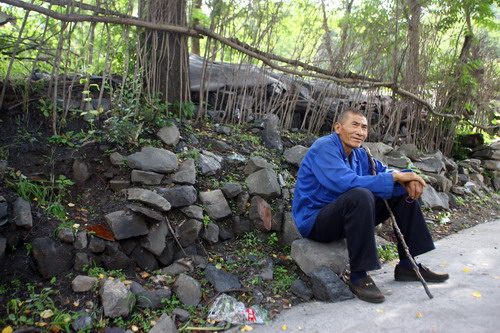Focus
Mine closures carve out a cleaner future
By Li Jiabao (China Daily)
Updated: 2010-06-24 09:35
 |
Large Medium Small |
 |
|
Qiaomeijing village was once famous for its abundant coal deposits. [China Daily] |
"Nearly all the small coalmines had expired contracts when they were shut down, but now the coal owners have to figure out an alternative way to support themselves," said Wang Xiyou.
He is planning to invest in energy-saving lamps with money he earned from his mine during the past three years.
The small and remote village of Qiaomujian, in Fangshan district, is now silent and messy but when mining was in its heyday, the village was prosperous and busy.
It received a constant stream of poor miners who risked their lives to make a living.
"Most of the miners are not local people. Many of the miners are poor people from the impoverished areas like Chengde, Hebei province, and Sichuan province," Wang said.
"Local people usually make a living from the coalmines by working as security personnel or guards while miners are people from remote areas," said a villager in her 50s surnamed Zhang.
"Whenever there are accidents, it is easy for the mine owners to solve the problem with money because these poor people have no relatives or friends to turn to."
Zhang claimed three migrant miners were killed in a mining accident in the coalmine in the village and said the owner paid each of their families 700,000 yuan.
She used to own a small coalmine that employed four or five miners in the past decade and says she made about one million yuan.
"Back in the 1950s, villagers relied on coalmining to support their lives but now, except for a few who still work in the mines of State-owned energy companies, most villagers have returned to farming or livestock," said a villager surnamed Wang, who is in his 80s.
Actually, Beijing's western coal base has a much longer history than the old man's age, dating back more than 1,000 years to the Tang dynasty and being known as the "fire of Beijing" after being the major power supplier to the Forbidden City.
"The small coalmines are privately-operated and employ migrant miners for a short period. When the coalmines are closed, these miners are then sent back to their remote homes whether they have active contracts or not," the mine contractor Wang said.
Small coalmines, which have long being criticized for having poor safety standards and for damaging the environment, have ensured the heating of thousands of homes in the capital's winter.
After the closing of all the small coalmines, local residents will turn to clean energy like liquefied petroleum gas for heating. Local governments have set up nine gas stations in three towns, according to Beijing TV news.
Mentougou district is set to become Beijing's Western Service District (WSD) while the former mining towns will become part of ecological conservation areas.
The move is geared to help local residents transform their lives from coalmining to green planting or forest guarding. Countryside tourism is also likely to become part of residents' future.
Fangshan district, mountain-featured like Mentougou district, will be part of the capital's new southern hub with a state investment of 290 billion yuan in the following three years, which even promotes the development of neighboring cities of Hebei province.